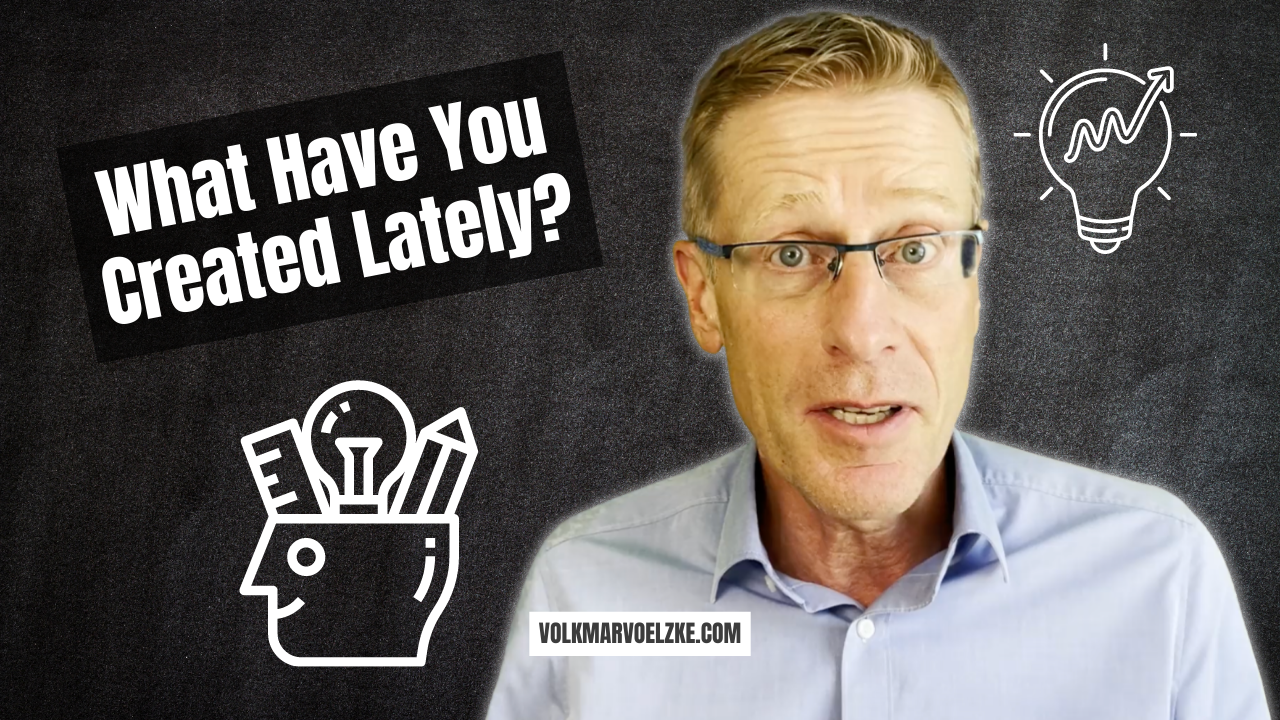🫣 Why Your People Don't Take Responsibility

This is one of the most common themes I encounter in leadership coaching: How can I get my people to take more responsibility?
The significance is clear: when someone takes on full responsibility, there is no blame, things get done faster, I can always rely on the other person, and so on.
Here is my hypothesis: most people like to take responsibility. It's just that it's constantly being taken away from them, even by their manager.
This is similar to motivation: Most people are motivated. They are just constantly demotivated by others, especially by their boss.
So the key question is: What are you doing to take responsibility away from your people without realizing it?
Here are three key behaviors you're teaching others to be irresponsible without noticing (and then I'll give you three tips on what to do instead):
- Too many instructions. Rules, processes and instructions have their purpose. But at the same time, they reduce the sense of responsibility. Because it wasn't me who made...
🎨 What Have You Created Lately?

At each moment in time, you have the choice between consuming, executing, and creating. In many cases we do not even decided by ourselves, but let others tell us which choice to make.
- Consuming. You are passively being driven by events, your environment, or other people. Or you actively process what others present to you, without any major initiative of your own. Typical consumption: Emails, social media, television, shopping, water cooler chats.
Important sub-category: consumption that grows our knowledge, skills, or capabilities. Examples: reading good books, listening to good audio programs, watching useful video courses. - Executing. You are actively processing something of more or less importance. All typical daily work routines fall into this category, as well as tasks that we execute at our jobs.
- Creating. You are creating something new. You leave a legacy, no matter how small. After any creation, there is something in the world for a certain period of time that...
😁 How To Boost Your Fun With Leadership

This is an extremely important topic today, where I see a lot of potential in most people. Most of the leaders I meet have fun in their job. They love the technical work.
Most of them have much less fun leading people.
Many associate leadership with a burden rather than the opportunity to achieve great things together with others. Thoughts turn to difficult "appraisal interviews," salary negotiations, conflict resolution, remembering deadlines and tasks, and so on.
These are all topics that are, of course, less fun. And that's also management rather than leadership.
The journey to fun leadership starts in the mind, namely with what I associate with leadership and how I see myself as a leader (for inspiration, you may also want to read the blog post about the success coach Jürgen Klopp that I published a few weeks ago).
When I coach leaders, I usually see a clear evolution from "leadership as a burden" to "leadership as an opportunity and source of joy" ( you can find more info...
👎 No, No, No!

Yes, say more “no”! And I don’t mean to other people, but to yourself. You have probably heard it often that we need to say “no” more to accomplish more in life. However, most of this advice is directed towards the outside world, to influences from others.
The thing is this: the more we focus on blocking things from outside, the less we focus on discipline for our own mind.
Often, we take the outside influence as an excuse for not behaving better on the inside.
The inconvenient truth is this: most success comes from disciplining ourselves in the first place, and only then should we look at the outside world.
So, here are my top 3 suggestions, to what you should say “no” to yourself.
Share this with your team and act accordingly. You will see your performance increase instantly.
- Say “no” to accepting low standards. We all have times when we "let things go”, when we sort of take it easy. My point is...
🧗 How To Accomplish Big Things With Small Steps

Actually, we all know this: If you consistently march in the same direction with small steps, you will progress faster than someone who takes big leaps in repeatedly different directions.
The reason for the high effectiveness of small consistent steps is the compounding effect, which then leads to exponential growth.
However, we tend to forget this wisdom. Our brain is programmed to pay more attention to what is new than to what remains the same.
Why is this important at all?
Well, any sustainable increase in performance and success, any improvement in teamwork, and any other improvement in corporate culture requires changing mindsets, behaviors, and habits.
And these changes only work through constant repetition with positive reinforcement.
The good news is: you often don't need a huge one-time effort to make powerful things happen. Repeating similar steps in the same direction over and over again is enough.
Here are three moves you can take to successfully implement this insight:
...⏰ Reminder: Your Daily Routines

Over half of the year has passed, so I think it’s time for a little reminder about your daily routines. What is your daily performance level? Are you satisfied with your daily results or do you see room for improvement?
Here are three proven tips on how you can grow your performance each day:
- Start fast. The first minutes of your day set the tone for the rest of your day. If you take it easy during the first 30-60 minutes, you signal to your subconscious mind that you can relax the entire day. If you do this repeatedly, you will have a hard time ever achieving high-performance throughout the day. That’s exactly what you see with many people.
- Eliminate decisions. Each decision we make requires energy and willpower. The most accomplished people eliminate decision needs wherever possible, e.g. on breakfast choices, what to wear, etc. By this, they have more energy for the truly important things.
- Schedule power blocks. Work for 60-90 minutes on one task with no...
🌩 Your Cognitive Dissonance

Today we're talking about a common phenomenon that gets in the way of our influence and success more often than we'd like to admit: cognitive dissonance.
This is a term from psychology that describes how, in many cases, when reality does not match our expectations, we prefer to reinterpret reality rather than adjust our expectations.
This can sometimes be useful in the sense that we try everything to change reality according to our goals. But it can also often lead us to disconnect more and more from reality and our environment.
This phenomenon can creep in anywhere and often occurs - but not only - in the executive suites of larger companies.
Why there in particular? Because more personal ego is involved: the more I manifest my expectations and couple them to my personality, the more difficult it is to adjust these expectations. The way out: I choose to interpret reality differently.
Now, as a leader, how can you escape this trap? I recommend three steps:
-
Listening well to...
🏋️♀️ Three Hacks To Grow Team Productivity By 25%

The amazing fact is that all teams can become more productive. Why is it, then, that most teams stay at their current levels, even if productivity gains could be relatively easy to achieve?
The simple answer: most people feel comfortable and safe in their current state.
This includes business leaders, teams, and entire organizations. Change is hard, even if this change means improvement. That’s why most obese people stay obese, smokers continue smoking, and people don’t become better leaders.
Despite these challenges, here are 3 strategies to grow your team productivity by 25% or more:
- Increase clarity. This sounds so simple and yet, most teams I see are not entirely clear about their mission, their vision, their standards, and other core elements of high-performing teams. Remember: nobody engages completely while uncertain.
- Increase passion. Too many teams are just “doing their job”, but lack any inspiration and full commitment....
🖼 How You Create Your Reality

Unfortunately, at the moment we see once again a vivid (and very sad) example of how a leader can get "his" people behind him to carry out certain actions.
Of course, I mean - you guessed it - the example of Putin and the Russian war of aggression on Ukraine. The aim of this article is not to take a political stand (although I do, of course), but to point out the mechanisms that have their effect here in the negative, but which - and this is the crucial lesson - can also be used for good.
What actually happened in Putin's Russia?
Essentially, there are three crucial elements that come together to send people to war and death with their consent (I then explain how you can use these correlations in the positive sense for your team or company):
- Consistent Story. For decades, the same version of the story has been and continues to be told and taught in schools: Russia is constantly threatened by other powers and must defend itself for "what is rightfully ours".
- Identity. Identity is...
🤣 Get Serious About Joy!

What if you do not only create great results in your life and business, but also make the road to these results the most joyful possible for yourself and your people in your team?
My point is this: there is no meaning in spending hours, days, weeks, months, or even years on topics we do not enjoy.
What is the meaning of results if your journey is a constant struggle?
To be clear, I am an advocate of the belief that we sometimes need to struggle to get to the next level, that we have to work hard and be relentless. But what I also suggest is not making the struggle the primary driving force.
Ask yourself, how much better could the performance, productivity, and quality of our work be if we were more joyful?
I suggest you make joy a top priority for your life and the people surrounding you. Here is how to do so in three simple steps:
- Identify sources of joy. Look at your most important tasks and responsibilities and for each item find at least one reason to be...
